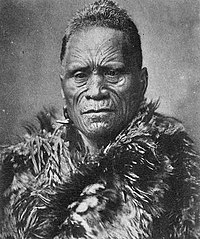Tāwhiao
 |
|
| Reign | 25 June 1860 – 26 August 1894 |
| Coronation | 5 July 1894 |
| Spouse |
Rangiaho |
| Predecessor | Pōtatau Te Wherowhero |
| Successor | Mahuta Tāwhiao |
| Father | Pōtatau Te Wherowhero |
| Mother | Whakaawi |
| Born | c. 1822 |
| Died | August 26, 1894 (aged 71–72) |
| Religion | Pai Mārire |
Rangiaho
Hera
Aotea
Tāwhiao (Tūkāroto Matutaera Pōtatau Te Wherowhero Tāwhiao;c. 1822 - 26 August 1894) was leader of the Waikato tribes, the second Māori King and a religious visionary. He was a member of the Ngāti Mahuta iwi (tribe) of Waikato.
Tāwhiao's father, Te Wherowhero, was the leader of the Waikato people, and his mother, Whakaawi, was Te Wherowhero's senior wife. He was born around 1822.
After the Waikato were defeated by musket-armed Ngāpuhi led by Hongi Hika in a battle at Matakitaki (Pirongia) in 1822, they retreated to Orongokoekoea Pā, in what is now the King Country, and lived there for several years. Tāwhiao was born at Orongokoekoea in about 1825 and was named Tūkāroto to commemorate, it is said, his father's stand at Matakitaki. Tūkāroto was later baptised Matutaera (Methuselah) by Anglican missionary Robert Burrows, but repudiated it in 1867.Te Ua Haumēne, the Hauhau prophet, gave him the name Tāwhiao in 1864. Tāwhiao was raised by his mother's parents.
In 1858 Te Wherowhero was installed as the first Māori King (taking the name Pōtatau), his purpose being to promote unity among the Māori people in the face of Pākehā encroachment. When Pōtatau died in 1860, Tāwhiao, his sister Te Paea Tiaho, and Wiremu Tamihana Tarapipipi of Ngāti Hauā were candidates to succeed him. Tāwhiao was chosen and reigned for thirty-four years during one of the most difficult and discouraging periods of Māori history. During this period there were de jure two governments; English law and governance prevailed within the British settlements and Māori custom over the rest of the country, although the influence of the King was largely confined to the Waikato and even there chiefs such as Rewi Maniapoto only cooperated with the king when it suited him. However the Pākehā population was increasing rapidly while the Māori population was unknown as there was no reliable census of Maori and Pakeha / Maori for 80 years. Because Maori separated themselves from Paheka, many believed, wrongly, that the Maori population was declining rapidly. This was also the period when British industrial, trade and political power was at its height. The presence of an independent native state in the central North Island was officially ignored by the government until it developed the potential to undermine the colonial government's sovereignty.
...
Wikipedia
